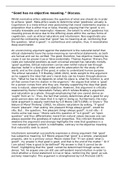Essay
Good has no objective meaning - Discuss.
- Course
- Institution
An A** 40-mark A-Level Ethics essay dissecting as to whether 'good' has meaning and, if so, the extent of this meaning. From the Meta-ethics topic within the OCR RS curriculum. Written by an A-Level student who achieved an A* in A-Level Religious Studies (a.k.a Philosophy and Ethics) (2022) and a ...
[Show more]



